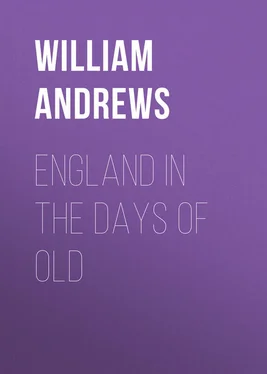William Andrews - England in the Days of Old
Здесь есть возможность читать онлайн «William Andrews - England in the Days of Old» — ознакомительный отрывок электронной книги совершенно бесплатно, а после прочтения отрывка купить полную версию. В некоторых случаях можно слушать аудио, скачать через торрент в формате fb2 и присутствует краткое содержание. ISBN: , Жанр: foreign_antique, foreign_prose, на английском языке. Описание произведения, (предисловие) а так же отзывы посетителей доступны на портале библиотеки ЛибКат.
- Название:England in the Days of Old
- Автор:
- Жанр:
- Год:неизвестен
- ISBN:http://www.gutenberg.org/ebooks/38905
- Рейтинг книги:4 / 5. Голосов: 1
-
Избранное:Добавить в избранное
- Отзывы:
-
Ваша оценка:
- 80
- 1
- 2
- 3
- 4
- 5
England in the Days of Old: краткое содержание, описание и аннотация
Предлагаем к чтению аннотацию, описание, краткое содержание или предисловие (зависит от того, что написал сам автор книги «England in the Days of Old»). Если вы не нашли необходимую информацию о книге — напишите в комментариях, мы постараемся отыскать её.
England in the Days of Old — читать онлайн ознакомительный отрывок
Ниже представлен текст книги, разбитый по страницам. Система сохранения места последней прочитанной страницы, позволяет с удобством читать онлайн бесплатно книгу «England in the Days of Old», без необходимости каждый раз заново искать на чём Вы остановились. Поставьте закладку, и сможете в любой момент перейти на страницу, на которой закончили чтение.
Интервал:
Закладка:
In the Gentlemen’s Magazine for 1782 we find particulars of past mayoral customs at Abingdon, Berkshire. “Riding through Abingdon,” says a correspondent, “I found the people in the street at the entrance of the town very busy in adorning the outside of their houses with boughs of trees and garlands of flowers, and the paths were strewed with rushes. One house was distinguished by a greater number of garlands than the rest. On inquiring the reason, it seemed that it was usual to have this ceremony performed in the street in which the new mayor lived, on the first Sunday that he went to church after his election.”
At Newcastle-on-Tyne still lingers a curious custom which dates back to the period when strife was rife between England and Scotland. It has long been the practice to present the judges attending the Assizes on their arrival with two pairs of gloves, a pair to each of their marshals and to the other members of their retinue, also to the clerks of Assize and their officers. The judges are entertained in a hospitable manner during their stay in the city. At the conclusion of the business of the Assizes the mayor and other members of the Corporation in full regalia wait upon the judges, and the mayor thus addresses them: —
“My Lords, we have to congratulate you upon having completed your labours in this ancient town, and have also to inform you that you travel hence to Carlisle, through a border county much and often infested by the Scots; we therefore present each of your lordships with a piece of money to buy therewith a dagger to defend yourselves.”
The mayor then gives the senior judge a piece of gold of the reign of James I., termed a Jacobus , and to the junior judge a coin of the reign of Charles I., called a Carolus . After the judge in commission has returned thanks the ceremony is ended. Some time ago a witty judge returned thanks as follows: “I thank the mayor and corporation much for this gift. I doubt, however, whether the Scots have been so troublesome on the borders lately; I doubt, too, whether daggers in any numbers are to be purchased in this ancient town for the protection of my suite and of myself; and I doubt if these coins are altogether a legal tender at the present time.”
The local authorities are anxious to keep up the ancient custom enjoined upon them by an old charter, but they often experience great difficulty in obtaining the old-time pieces of money. Sometimes as much as £15 has been paid for one of the scarce coins. “Upon the resignation or the death of a judge who has travelled the northern circuit, we are told the corporation at once offer to purchase from his representative the ‘dagger-money’ received on his visits to Newcastle, in order to use it on future occasions.”
It was customary, in the olden time, for the mayor and other members of the Banbury Corporation to repair to Oxford during the assizes and visit the judge at his lodgings, and the mayor, with all the graces of speech at his command, ask “my lord” to accept a present of the celebrated Banbury cakes, wine, some long clay pipes, and a pound of tobacco. The judge accepted these with gratitude, or, at all events, in gracious terms expressed his thanks for their kindness.
The Corporation of Ludlow used to offer hospitality to the judges. The representatives of the town met the train in which the judges travelled from Shrewsbury to Hereford, and offered to them cake and wine, the former on an ancient silver salver, and the latter in a loving-cup wreathed with flowers. Mr. Justice Hill was the cause of the custom coming to a conclusion in 1858. He was travelling the circuit, and he communicated with the mayor saying, “owing to the delay occasioned, Her Majesty’s judges would not stop at Ludlow to receive the wonted hospitality.” We are told the mayor and corporation were offended, and did not offer to renew the ancient courtesy.
The making of a “sutor of Selkirk” is attended with some ceremony. “It was formerly the practice of the burgh corporation of Selkirk,” says Dr. Charles Rogers, the social historian of Scotland, “to provide a collation or dejeûner on the invitation of a burgess. The rite of initiation consisted in the newly-accepted brother passing through the mouth a bunch of bristles which had previously been mouthed by all the members of the board. This practice was termed ‘licking the birse:’ it took its origin at a period when shoemaking was the staple trade of the place, the birse being the emblem of the craft. When Sir Walter Scott was made a burgess or ‘sutor of Selkirk,’ he took precaution before mouthing the beslabbered brush to wash it in his wine, but the act of rebellion was punished by his being compelled to drink the polluted liquor.” In 1819, Prince Leopold was created “a sutor of Selkirk,” but the ceremony was modified to meet his more refined tastes, and the old style has not been resumed. Mr. Andrew Lang, a distinguished native of the town, has had the honour conferred upon him of being made a sutor.
The Mayor of Altrincham, Cheshire, in bygone times was, if we are to put any faith in proverbial lore, a person of humble position, and on this account the “honour” was ridiculed. An old rhyme says —
“The Mayor of Altrincham, and the Mayor of Over,
The one is a thatcher, and the other a dauber.”
Sir Walter Scott, in “The Heart of Mid-Lothian,” introduces the mayor into his pages in no flattering manner. Mr. Alfred Ingham, in his “History of Altrincham and Bowdon” (1879), has collected for his book some curious information bearing on this theme. He relates a tradition respecting one of the mayors gifted with the grace of repartee, which is well worth reproducing: – “The Mayor of Over – for he and the Mayor of Altrincham are often coupled – journeyed once upon a time to Manchester. He was somewhat proud, though he went on foot, and on arriving at Altrincham, felt he would be all the better for a shave. The knight of the steel and the strop performed the operation most satisfactorily; and as his worship rose to depart, he said rather grand-eloquently, ‘You may tell your customers that you have had the honour of shaving the Mayor of Over.’ ‘And you,’ retorted the ready-witted fellow, ‘may tell yours that you have had the honour of being shaved by the Mayor of Altrincham.’ The rest can be better imagined than described.”
We learn from Mr. J. Potter Briscoe that a strange tradition still lingers in Nottingham, to the effect that when King John last visited the town, he called at the house of the mayor, and the residence of the priest of St. Mary’s. Finding neither ale in the cellar of one, nor bread in the cupboard of the other, His Majesty ordered every publican in the town to contribute sixpennyworth of ale to the mayor annually, and that every baker should give a half-penny loaf weekly to the priest. The custom was continued down to the time of Blackner, the Nottingham historian, who published his history in 1815.
The mayor of Rye, in bygone times, had almost unlimited authority, and if anyone spoke evil of him, he was immediately taken and grievously punished by his body, but if he struck the mayor, he ran the risk of having cut off the hand that dealt the blow.
As late as 1600, at Hartlepool, it was enacted, that anyone calling a member of the council a liar be fined eleven shillings and sixpence, if, however, the term false was used, the fine was only six shillings and eightpence.
Bribes for the Palate
In the days of old it was no uncommon practice for public bodies and private persons to attempt to bribe judges and others with presents. Frequently the gifts consisted of drink or food. In some instances money was expected and given. It is not, however, to bribery in general we want to direct attention, but to some of its more curious phases, and especially those which appealed to the recipients’ love of good cheer.
Читать дальшеИнтервал:
Закладка:
Похожие книги на «England in the Days of Old»
Представляем Вашему вниманию похожие книги на «England in the Days of Old» списком для выбора. Мы отобрали схожую по названию и смыслу литературу в надежде предоставить читателям больше вариантов отыскать новые, интересные, ещё непрочитанные произведения.
Обсуждение, отзывы о книге «England in the Days of Old» и просто собственные мнения читателей. Оставьте ваши комментарии, напишите, что Вы думаете о произведении, его смысле или главных героях. Укажите что конкретно понравилось, а что нет, и почему Вы так считаете.












